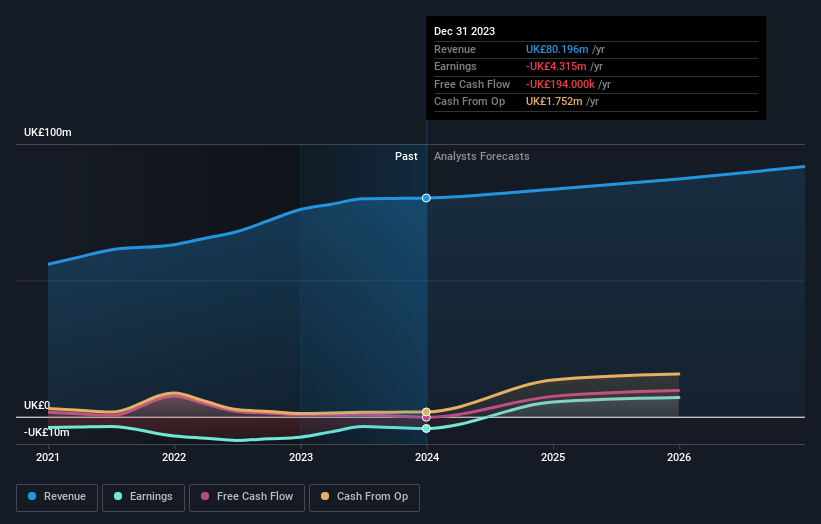- United Kingdom
- /
- Media
- /
- AIM:EBQ
Earnings Miss: Ebiquity plc Missed EPS And Analysts Are Revising Their Forecasts
It's been a good week for Ebiquity plc (LON:EBQ) shareholders, because the company has just released its latest full-year results, and the shares gained 7.3% to UK£0.44. Things were not great overall, with a surprise (statutory) loss of UK£0.032 per share on revenues of UK£80m, even though the analysts had been expecting a profit. Earnings are an important time for investors, as they can track a company's performance, look at what the analysts are forecasting for next year, and see if there's been a change in sentiment towards the company. We thought readers would find it interesting to see the analysts latest (statutory) post-earnings forecasts for next year.
See our latest analysis for Ebiquity

Following the latest results, Ebiquity's three analysts are now forecasting revenues of UK£83.4m in 2024. This would be a reasonable 4.1% improvement in revenue compared to the last 12 months. Ebiquity is also expected to turn profitable, with statutory earnings of UK£0.038 per share. In the lead-up to this report, the analysts had been modelling revenues of UK£83.5m and earnings per share (EPS) of UK£0.067 in 2024. So there's definitely been a decline in sentiment after the latest results, noting the large cut to new EPS forecasts.
It might be a surprise to learn that the consensus price target was broadly unchanged at UK£0.92, with the analysts clearly implying that the forecast decline in earnings is not expected to have much of an impact on valuation. That's not the only conclusion we can draw from this data however, as some investors also like to consider the spread in estimates when evaluating analyst price targets. There are some variant perceptions on Ebiquity, with the most bullish analyst valuing it at UK£1.05 and the most bearish at UK£0.71 per share. This shows there is still a bit of diversity in estimates, but analysts don't appear to be totally split on the stock as though it might be a success or failure situation.
Looking at the bigger picture now, one of the ways we can make sense of these forecasts is to see how they measure up against both past performance and industry growth estimates. We can infer from the latest estimates that forecasts expect a continuation of Ebiquity'shistorical trends, as the 4.1% annualised revenue growth to the end of 2024 is roughly in line with the 3.7% annual growth over the past five years. Compare this with the broader industry, which analyst estimates (in aggregate) suggest will see revenues grow 2.5% annually. So it's pretty clear that Ebiquity is forecast to grow substantially faster than its industry.
The Bottom Line
The most important thing to take away is that the analysts downgraded their earnings per share estimates, showing that there has been a clear decline in sentiment following these results. Happily, there were no major changes to revenue forecasts, with the business still expected to grow faster than the wider industry. The consensus price target held steady at UK£0.92, with the latest estimates not enough to have an impact on their price targets.
With that said, the long-term trajectory of the company's earnings is a lot more important than next year. We have estimates - from multiple Ebiquity analysts - going out to 2026, and you can see them free on our platform here.
Even so, be aware that Ebiquity is showing 2 warning signs in our investment analysis , you should know about...
Valuation is complex, but we're here to simplify it.
Discover if Ebiquity might be undervalued or overvalued with our detailed analysis, featuring fair value estimates, potential risks, dividends, insider trades, and its financial condition.
Access Free AnalysisHave feedback on this article? Concerned about the content? Get in touch with us directly. Alternatively, email editorial-team (at) simplywallst.com.
This article by Simply Wall St is general in nature. We provide commentary based on historical data and analyst forecasts only using an unbiased methodology and our articles are not intended to be financial advice. It does not constitute a recommendation to buy or sell any stock, and does not take account of your objectives, or your financial situation. We aim to bring you long-term focused analysis driven by fundamental data. Note that our analysis may not factor in the latest price-sensitive company announcements or qualitative material. Simply Wall St has no position in any stocks mentioned.
About AIM:EBQ
Ebiquity
Provides media investment analysis services in the United Kingdom, Ireland, North America, Continental Europe, and the Asia Pacific.
Undervalued with adequate balance sheet.
Market Insights
Weekly Picks

Solutions by stc: 34% Upside in Saudi's Digital Transformation Leader


The AI Infrastructure Giant Grows Into Its Valuation
Recently Updated Narratives

Perdana Petroleum Berhad is a Zombie Business with a 27.34% Profit Margin and inflation adjusted revenue Business
Many trends acting at the same time


Engineered for Stability. Positioned for Growth.
Popular Narratives


MicroVision will explode future revenue by 380.37% with a vision towards success


NVDA: Expanding AI Demand Will Drive Major Data Center Investments Through 2026



